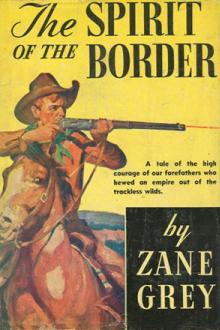Desert Gold, Zane Grey [best book series to read TXT] 📗

- Author: Zane Grey
Book online «Desert Gold, Zane Grey [best book series to read TXT] 📗». Author Zane Grey
In the morning, when Warren brought the burros to camp and began preparations for the usual packing, Cameron broke silence.
"Pardner, your story last night made me think. I want to tell you something about myself. It's hard enough to be driven by sorrow for one you've loved, as you've been driven; but to suffer sleepless and eternal remorse for the ruin of one you've loved as I have suffered—that is hell.... Listen. In my younger days—it seems long now, yet it's not so many years—I was wild. I wronged the sweetest and loveliest girl I ever knew. I went away not dreaming that any disgrace might come to her. Along about that time I fell into terrible moods—I changed—I learned I really loved her. Then came a letter I should have gotten months before. It told of her trouble—importuned me to hurry to save her. Half frantic with shame and fear, I got a marriage certificate and rushed back to her town. She was gone—had been gone for weeks, and her disgrace was known. Friends warned me to keep out of reach of her father. I trailed her—found her. I married her. But too late!... She would not live with me. She left me—I followed her west, but never found her."
Warren leaned forward a little and looked into Cameron's eyes, as if searching there for the repentance that might make him less deserving of a man's scorn.
Cameron met the gaze unflinchingly, and again began to speak:
"You know, of course, how men out here somehow lose old names, old identities. It won't surprise you much to learn my name really isn't Cameron, as I once told you."
Warren stiffened upright. It seemed that there might have been a blank, a suspension, between his grave interest and some strange mood to come.
Cameron felt his heart bulge and contract in his breast; all his body grew cold; and it took tremendous effort for him to make his lips form words.
"Warren, I'm the man you're hunting. I'm Burton. I was Nell's lover!"
The old man rose and towered over Cameron, and then plunged down upon him, and clutched at his throat with terrible stifling hands. The harsh contact, the pain awakened Cameron to his peril before it was too late. Desperate fighting saved him from being hurled to the ground and stamped and crushed. Warren seemed a maddened giant. There was a reeling, swaying, wrestling struggle before the elder man began to weaken. The Cameron, buffeted, bloody, half-stunned, panted for speech.
"Warren—hold on! Give me—a minute. I married Nell. Didn't you know that?... I saved the child!"
Cameron felt the shock that vibrated through Warren. He repeated the words again and again. As if compelled by some resistless power, Warren released Cameron, and, staggering back, stood with uplifted, shaking hands. In his face was a horrible darkness.
"Warren! Wait—listen!" panted Cameron. "I've got that marriage certificate—I've had it by me all these years. I kept it—to prove to myself I did right."
The old man uttered a broken cry.
Cameron stole off among the rocks. How long he absented himself or what he did he had no idea. When he returned Warren was sitting before the campfire, and once more he appeared composed. He spoke, and his voice had a deeper note; but otherwise he seemed as usual.
They packed the burros and faced the north together.
Cameron experienced a singular exaltation. He had lightened his comrade's burden. Wonderfully it came to him that he had also lightened his own. From that hour it was not torment to think of Nell. Walking with his comrade through the silent places, lying beside him under the serene luminous light of the stars, Cameron began to feel the haunting presence of invisible things that were real to him—phantoms whispering peace. In the moan of the cool wind, in the silken seep of sifting sand, in the distant rumble of a slipping ledge, in the faint rush of a shooting star he heard these phantoms of peace coming with whispers of the long pain of men at the last made endurable. Even in the white noonday, under the burning sun, these phantoms came to be real to him. In the dead silence of the midnight hours he heard them breathing nearer on the desert wind—nature's voices of motherhood, whispers of God, peace in the solitude.
IV
There came a morning when the sun shone angry and red through a dull, smoky haze.
"We're in for sandstorms," said Cameron.
They had scarcely covered a mile when a desert-wide, moaning, yellow wall of flying sand swooped down upon them. Seeking shelter in the lee of a rock, they waited, hoping the storm was only a squall, such as frequently whipped across the open places. The moan increased to a roar, and the dull red slowly dimmed, to disappear in the yellow pall, and the air grew thick and dark. Warren slipped the packs from the burros. Cameron feared the sandstorms had arrived some weeks ahead of their usual season.
The men covered their heads and patiently waited. The long hours dragged, and the storm increased in fury. Cameron and Warren wet scarfs with water from their canteens, and bound them round their faces, and then covered their heads. The steady, hollow bellow of flying sand went on. It flew so thickly that enough sifted down under the shelving rock to weight the blankets and almost bury the men. They were frequently compelled to shake off the sand to keep from being borne to the ground. And it was necessary to keep digging out the packs. The floor of their shelter gradually rose higher and higher. They tried to eat, and seemed to be grinding only sand between their teeth. They lost the count of time. They dared not sleep, for that would have meant being buried alive. The could only crouch close to the leaning rock, shake off the sand, blindly dig out their packs, and every moment gasp and cough and choke to fight suffocation.
The storm finally blew itself out. It left the prospectors heavy and stupid for want of sleep. Their burros had wandered away, or had been buried in the sand. Far as eye could reach the desert had marvelously changed; it was now a rippling sea of sand dunes. Away to the north rose the peak that was their only guiding mark. They headed toward it, carrying a shovel and part of their packs.
At noon the peak vanished in the shimmering glare of the desert. The prospectors pushed on, guided by the sun. In every wash they tried for water. With the forked peach branch in his hands Warren always succeeded in locating water. They dug, but it lay too deep. At length, spent and sore, they fell and slept through that night and part of the next day. Then they succeeded in getting water, and quenched their thirst, and filled the canteens, and cooked a meal.
The burning day found them in an interminably wide plain, where there was no shelter from the fierce sun. The men were exceedingly careful with their water, though there was absolute necessity of drinking a little every hour. Late in the afternoon they came to a canyon that they believed was the lower end of the one in which they had last found water. For hours they traveled toward its head, and, long after night had set, found what they sought. Yielding to exhaustion, they slept, and next day were loath to leave the waterhole. Cool night spurred them on with canteens full and renewed strength.
Morning told Cameron that they had turned back miles into the desert, and it was desert new to him. The red sun, the increasing heat, and especially the variety and large size of the cactus plants warned Cameron that he had descended to a lower level. Mountain peaks loomed on all sides, some near, others distant; and one, a blue spur, splitting the glaring sky far to the north, Cameron thought he recognized as a landmark. The ascent toward it was heartbreaking, not in steepness, but in its league-and-league-long monotonous rise. Cameron knew there was only one hope—to make the water hold out and never stop to rest. Warren began to weaken. Often he had to halt. The burning white day passed, and likewise the night, with its white stars shining so pitilessly cold and bright.
Cameron measured the water in his canteen by its weight. Evaporation by heat consumed as much as he drank. During one of the rests, when he had wetted his parched mouth and throat, he found opportunity to pour a little water from his canteen into Warren's.
At first Cameron had curbed his restless activity to accommodate the pace of his elder comrade. But now he felt that he was losing something of his instinctive and passionate zeal to get out of the desert. The thought of water came to occupy his mind. He began to imagine that his last little store of water did not appreciably diminish. He knew he was not quite right in his mind regarding water; nevertheless, he felt this to be more of fact than fancy, and he began to ponder.
When next they rested he pretended to be in a kind of stupor; but he covertly watched Warren. The man appeared far gone, yet he had cunning. He cautiously took up Cameron's canteen and poured water into it from his own.
This troubled Cameron. The old irritation at not being able to thwart Warren returned to him. Cameron reflected, and concluded that he had been unwise not to expect this very thing. Then, as his comrade dropped into weary rest, he lifted both canteens. If there were any water in Warren's, it was only very little. Both men had been enduring the terrible desert thirst, concealing it, each giving his water to the other, and the sacrifice had been useless.
Instead of ministering to the parched throats of one or both, the water had evaporated. When Cameron made sure of this, he took one more drink, the last, and poured the little water left into Warren's canteen. He threw his own away.
Soon afterward Warren discovered the loss.
"Where's your canteen?" he asked.
"The heat was getting my water, so I drank what was left."
"My son!" said Warren.
The day opened for them in a red and green hell of rock and cactus. Like a flame the sun scorched and peeled their faces. Warren went blind from the glare, and Cameron had to lead him. At last Warren plunged down, exhausted, in the shade of a ledge.
Cameron rested and waited, hopeless, with hot, weary eyes gazing down from the height where he sat. The ledge was the top step of a ragged gigantic stairway. Below stretched a sad, austere, and lonely valley. A dim, wide streak, lighter than the bordering gray, wound down the valley floor. Once a river had flowed there, leaving only a forlorn trace down the winding floor of this forlorn valley.
Movement on the part of Warren attracted Cameron's attention. Evidently the old prospector had recovered his sight and some of his strength, for he had arisen, and now began to walk along the arroyo bed with his forked peach branch held before him. He had clung to the precious bit of wood. Cameron considered the prospect for water hopeless, because he saw that the arroyo had once been a canyon, and had been filled with sands by desert winds. Warren, however, stopped in a deep pit, and, cutting his canteen in half, began to use one side of it as a scoop. He scooped out a wide hollow, so wide that Cameron was certain he had gone crazy. Cameron gently urged him to stop, and then forcibly tried to make him. But these efforts were futile. Warren worked with slow, ceaseless, methodical movement. He toiled for what seemed hours. Cameron, seeing the darkening, dampening sand, realized a wonderful possibility of water, and he plunged into the pit with the other half of the canteen. Then both men toiled, round and round the wide hole, down deeper and deeper. The sand grew moist, then wet. At the bottom of the deep pit the sand coarsened, gave place to gravel. Finally water welled in, a stronger volume than Cameron ever remembered finding on the desert. It would soon fill the





Comments (0)